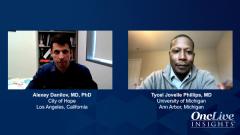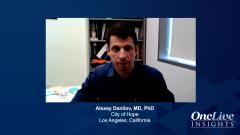
Emerging Agents for R/R MZL
Drs. Alexey Danilov and Tycel Jovelle Phillips share insight on emerging agents and future directions for the management of marginal zone lymphoma.
Episodes in this series

Tycel Jovelle Phillips, MD: Dr Danilov, what are some of the key ongoing trials in relapsed/refractory marginal zone lymphoma that have you excited and looking forward to over the next several years?
Alexey Danilov, MD, PhD: That’s the field where I don’t anticipate any large trials. However, there are agents that are emerging and effective in other types of NHL [non-Hodgkin lymphoma] that will also be interesting here. I’m looking forward to results of a study of, for example, acalabrutinib, a second-generation BTK [Bruton tyrosine kinase] inhibitor in marginal zone lymphoma that we have here at City of Hope [Los Angeles, California]. We’ve also been working with protein-targeting…, which are drugs specifically designed to address Bruton tyrosine kinase inhibitor resistance but also have immunomodulatory effects. And then bispecific antibodies, there are trials with bispecifics that enroll patients with non-Hodgkin lymphoma, where there is also some preliminary efficacy in marginal zone lymphoma. There are, I’d say, a few indicated studies for this disease. But overall, these patients are typically part of larger trials with all these novel agents. We will see more agents emerge for this disease just like we do for follicular lymphoma and for other indolent lymphomas.
Tycel Jovelle Phillips, MD: You’ve highlighted some of the challenges that we have with marginal zone lymphomas, especially the simple fact of numbers of patients who require treatment. Again, a lot of these patients will get folded into some of these more common indolent lymphoma studies, like follicular lymphoma, as a small subset. Some of the other issues that we’ve yet to fully address include POD24 [progression of disease within 24 months], and early progression in patients appears also to be an issue especially with patients with marginal zone lymphoma, as we see with follicular lymphoma, and has been published by the Italian group. Further evaluation of this patient population and whether something needs to be done differently in these patients will be something that will need to be teased out in coming years. Hopefully, we’ll be able to get some information for these patients because it’ll likely be challenging to power a study completely enrolling these patients with POD24 marginal zone lymphoma because of the sheer numbers.
But the future is bright for patients with relapsed/refractory marginal zone lymphoma. As you mentioned, with some of these newer agents coming out and further experience and knowledge that we get from the ones that are FDA approved, we’ll continue to be able to extend the overall survival of these patients in this population. Hopefully, we’ll continue to provide these patients with very appealing and safe toxicity profiles with the agents that we’re utilizing to continue to allow patients with marginal zone lymphoma to have a very nice curve compared with some of the patients with other non-Hodgkin lymphomas who we treat daily.
This has been an extremely informative discussion. I’d like to thank Dr Danilov for his insightful discussion and joining me today in this meeting. I’d like to thank our audience for watching this OncLive® Insights presentation on “Optimizing Treatment for Relapsed/Refractory Follicular Lymphoma and Marginal Zone Lymphoma.” We both hope that you found this discussion to be useful, informative, and something you can utilize for the patients you treat on a day-to-day basis.
Transcript Edited for Clarity







































